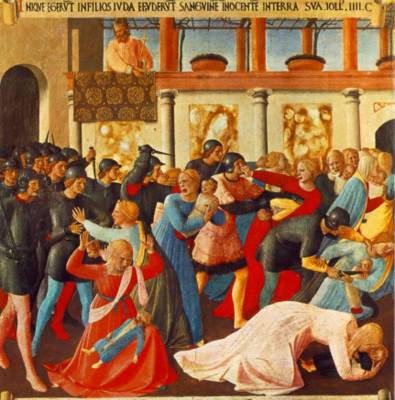Dec 28: The Massacre of the Holy Innocents

Fra Angelico: The Massacre of the Innocents
Museo di San Marco, Florence, 1450
Feast of the Holy Innocents, martyrs
Gospel: Mt 2:13-18
“A voice was heard in Ramah, wailing and loud lamentation, Rachel weeping for her children; she refused to be consoled, because they are no more (NRSV, Mt 2:18).”
Father, we listen to the proclamation of Matthew’s gospel for the Feast of the Holy Innocents and outrage surges up within our hearts. It brings immediately to mind the plight of so many of today’s children in the Sudan and elsewhere in the world, deprived of family, sustenance and even life. So many children suffering from HIV/AIDS. There is also the great contemporary moral problem of the cutting off of human life within the womb for which many also use the word massacre. The homilist for today’s liturgy might take the occasion to rally an activist response to these pressing ethical issues. They are a gathering cry to action on our part.
But such would not be Matthew’s intent, Lord, nor would it be that of Jesus in his public preaching. Both are primarily concerned with recognizing and accepting you, Lord, as the one who saves in all of life's situations. There is nothing that we can accomplish but that it comes from you.
I always remember the seemingly harsh words which the Lord Jesus spoke to the would-be disciple who wanted to follow Jesus but who would first lay to rest his father: "Let the dead bury their own dead; but as for you, go and proclaim the kingdom of God."
The story of the massacre of the innocents in Matthew, Lord, only takes up one verse but it has scarred the collective consciousness of believers. The crime is not mentioned in any other document. Even the historian Flavius Josephus who despised Herod ignores it. Can it be, Lord, that Matthew invents the incident and uses it to shock-teach us?
Matthew wants to make it clear to us that Jesus is the new Moses. Moses also, in his birth story, miraculously escapes death in the massacre of the Hebrew children perpetrated by Pharaoh. Moses is saved by being placed in a basket to let float on the Nile and is rescued by Pharoah’s daughter. This part of Moses’ story, we cannot forget, Lord, is also told of Sargon, saved by a shepherd out of a similar basket that was let float on the Euphrates. Sargon goes on to become king of Akkad. We remember, Lord, that we are in the realm of birth stories which in the ancient Near East were often highly elaborated and were meant primarily to instruct.
Matthew, in writing of Herod’s massacre, quotes you, Father, speaking through your prophet Jeremiah of the long dead Rachel weeping for her children, actually her descendants who were killed or taken into captivity.
But, Lord, having told us of Rachel’s weeping, you immediately go on, through Jeremiah, to give us a message of hope, at least as Jeremiah can best understand it, still limited as it is to the land as his vision for the people: “Keep your voice from weeping, and your eyes from tears; for there is a reward for your work, they shall come back from the land of the enemy; there is hope for your future, your children shall come back to their own country.”
Jesus knows better than to speak of the land. When he chides the would-be disciple who wants first to bury his father, Jesus is telling him and us, that there is one reality that always comes first and it is not the land. It is your kingdom, Lord, which has its final clear expression in Jesus’ own resurrection, and in ours as well.
Matthew speaks of dark things, the killing of infants. Then he gives us a real foundation of hope for the future: the holy family is delivered from danger, Lord, through the message of your angel in a dream.
We understand well now, through the mystery of Jesus, that we are delivered from everything that threatens us, however ominous, by your one saving act, Father, present in every time and place, which is the sharing of your divine life with us if only we would accept it. This gift gives us real hope in every situation. It enables us to come through all of the vicissitudes of this life as victors, no matter how harsh they may be, and it brings us resurrection here in this life and in the world to come.
Jeremiah finally spoke a message of hope for Rachel and her children, even if it was limited to this world. Jesus and Matthew’s gospel speak a message of hope anchored in the world to come but also bursting forth into this world.
Once we choose your kingdom, Lord, we have no other option but to bury our dead father . . . and we have no other option but to come to the aid of helpless children wherever they may be and in whatever condition. As we choose you first, Lord God, you then send us to share your life and your love with all of our sisters and brothers in need.
Through Christ our Lord. Amen

0 Comments:
Post a Comment
<< Home